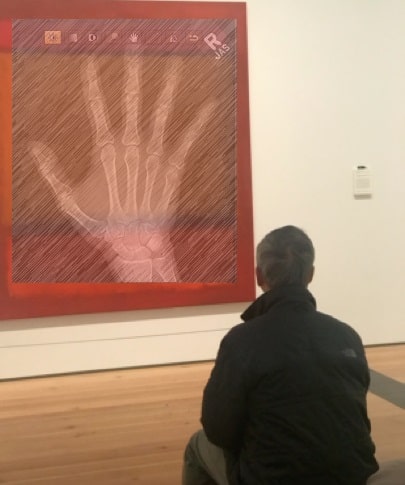 What is CT looking at? Could it be his own radiology image in his patient portal? What does this mean about secrecy in healthcare?
What is CT looking at? Could it be his own radiology image in his patient portal? What does this mean about secrecy in healthcare?
This blog includes three components: a rant about Information Blocking, Open Notes, and unintended consequence; the slides from my talk at CHIME (“Is this the End of Secrecy in Healthcare?”); and a ukulele song entitled, “I Can See Clearly Now, My Sprain is Gone.”
The Rant
As followers of my blog (Undiscovered Country) know, I’ve written about our Open Notes journey, our innovation to release radiology images to patients via portal, our sharing of patient co-pay for prescriptions, and our participation in the Our Notes project to have patients co-author their own clinic progress notes.
And now, CMS’ latest regulation on Information Blocking, part of the 21st Century CURES act, has detailed stipulations on what must be released to patients, including Open Notes in clinic, in the emergency department, and for inpatient notes. It turns physician paternalism on its head: we should release all information to patients, unless there is a compelling reason not to.
Your organization should be scrambling to get this in front of your providers to discuss the immediate release of progress notes, consult notes, history/physicals, operative reports, discharge summaries, laboratory report narratives, radiology report narratives, and pathology report narratives. If not, then you are behind the eight-ball.
Full disclosure, I was part of a Robert Wood Johnson sponsored event to explain Open Notes to congressional leaders in Washington, D.C. two years ago. Little did I know we’d end up here, with the regulations not only catching up to the literature (benefits of Open Notes in ambulatory settings), but surpassing it and requiring Open Notes in the Inpatient Setting.
We published our experience with Inpatient Open Notes in 2013. The results: lukewarm. Our providers and nurses were very concerned before the project, somewhat less concerned after. Our patients were underwhelmed with the offer of viewing their notes. Others have written that the potential challenges with communication, anxiety, and increased workload may negate the benefits.
There’s concern that providers will stop writing important discussions and debates in progress notes because of fear that the patient or their family will immediately see them (eg: “there are several possible cancer diagnoses we are considering that might cause this”, OR, “be careful when you go in that room, the father can be very aggressive”). Certainly, with more care and thoughtfulness, we can write better notes, but should we require that? Are hospital providers not already working too-long shifts and already burned out from excessive administrative work? I’m uncertain.
I am concerned that mandating the release of inpatient daily progress notes immediately to the patient may result in significant unintended consequences, with benefits that may not overcome the risks.
But, here we are. The full details and FAQ of Information Blocking (how soon must notes/results be released? how extensively? Retroactive to all notes written electronically, back to 2003?) are still pending, and yet the regulation goes into effect in November. 2020. Soon.
Since 2003, we have had rules for built-in time delays for the release of test results to patients. These applied to both outpatients and inpatients. We have been pleased that our release of blood tests to patients has been “immediately” since 2003. However, we do delay complex radiology imaging (CT, MRI, PET) for 7 days and pathology results for 14 days so that potential cancer diagnoses are communicated from the provider rather than “discovered” online.
This will now have to change, and urgently. I am convinced we can get to immediate release of all results and notes, but it will take some hard thinking, some hard cultural conversations, some letting-go of old traditions, some problem-solving of potential new problems, lots of anticipatory planning (how to educate patients on what they might be the first to see online), and also (as per the Leading Change principles) time to grieve the loss of the “old ways.”
Is this the end of secrecy in healthcare?
Click here to view the slide deck I presented at last year’s CHIME Fall Forum, as well as a few other events, detailing the information transparency efforts we are undertaking at UCHealth.
And a song
Far be it from me to lose an opportunity to sing! My latest song can be viewed here.
[This piece was originally published on The Undiscovered Country, a blog written by CT Lin, MD, CMIO at UCHealth and professor at University of Colorado School of Medicine. To follow him on Twitter, click here.]
